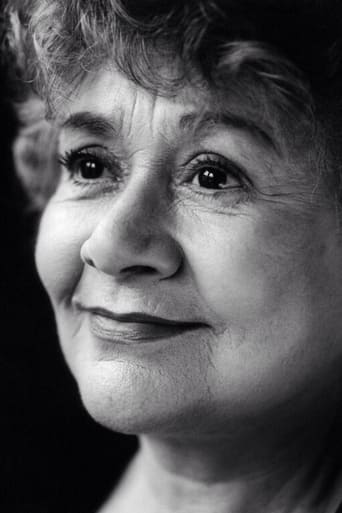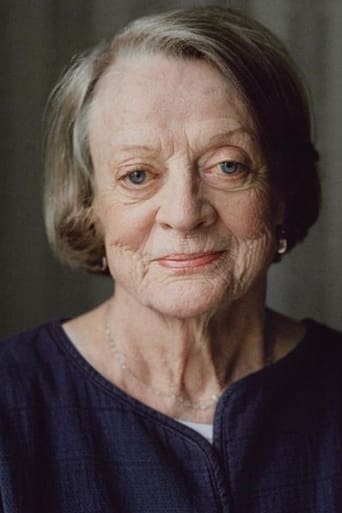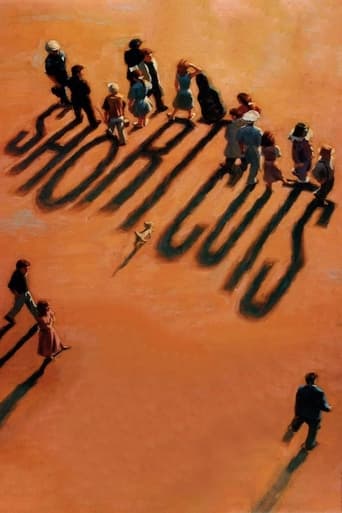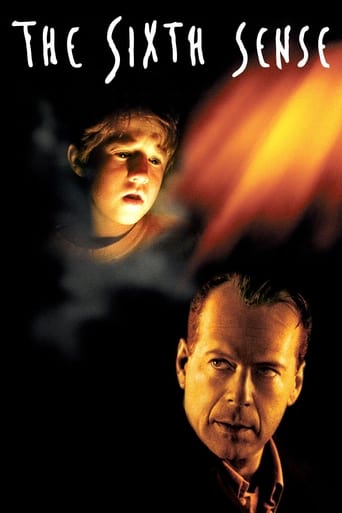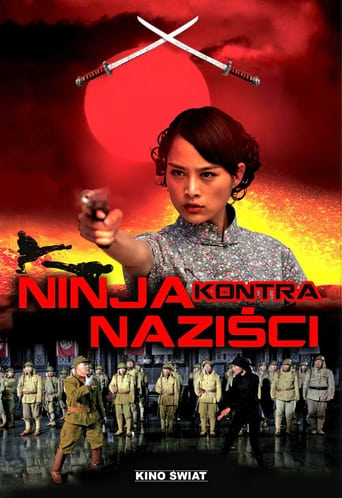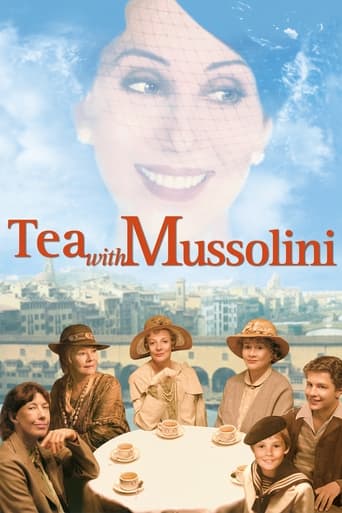
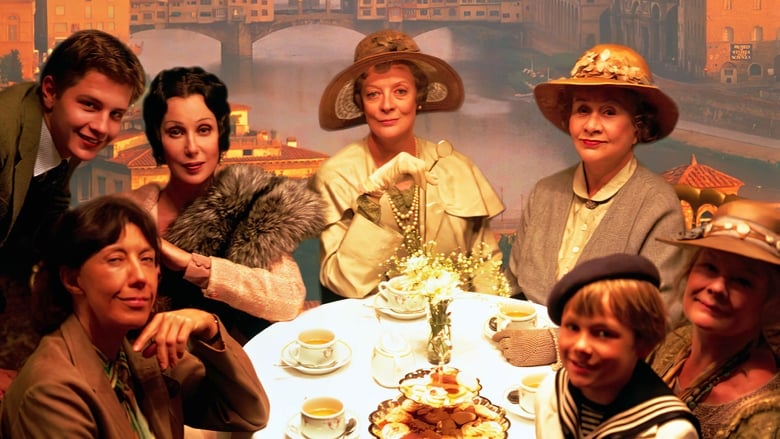
Tea with Mussolini (1999)
In 1930s fascist Italy, adolescent Luca just lost his mother. His father, a callous businessman, sends him to be taken care of by British expatriate Mary Wallace. Mary and her cultured friends - including artist Arabella, young widow Elsa, and archaeologist Georgie - keep a watchful eye over the boy. But the women's cultivated lives take a dramatic turn when Allied forces declare war on Mussolini.
Watch Trailer
Cast


Similar titles
Reviews
Despite the cast, this isn't a Merchant/Ivory production. Franco Zeffirelli's autobiographical film of his youth spent amongst the English "Scorpioni" in Florence before and during WWII is a very heartfelt piece of work. In the hands of three British ex-pats (Maggie Smith, Judi Dench, and Joan Plowright), young "Luca" is raised to appreciate art and life...and to tolerate A LOT! Also in the mix is Cher, as an American showgirl/benefactor with the exhaustive name of Elsa Morganthal Strauss-Armistan, and Lily Tomlin as a free-spirited archaeologist. The acting by all is exceptional, with Plowright a real standout as the Earth mother of the group. Cher has the longest name, but the briefest role. It does, however, turn out to be very pivotal. Dench is very funny as a ditsy culture vulture and Smith is perfect as the uptight (self appointed) leader of the den. Zeffirelli's script (co-written by John Mortimer) is funny (is there really a tea with Il Duce?), suspenseful, and even a little scary. This is the director's finest film in years. The great cinematography is by David Watkins.
I was really disappointed with this film. The only reason I watched it was because of Dame Maggie Smith (who I adore) and Cher (because I was intrigued). I felt as though the director wanted to create a mass-murder using boredom. The plot is bizarre. Consider the grandson (or whatever the hell he was - he rarely spoke) of Dame Maggie's character. They dressed him as a girl so he would be imprisoned with the old ladies in the tower. It was slightly amusing at first, but he somehow manages to continue the deceit to the point that one of the guard's wanted to date him - despite his totally unconvincing appearance as a woman. If this was a comedy, that might be funny a la 'Some Like It Hot'. But this is supposed to be a drama? The kid (and later teenager) Luca was boring and clearly included in the story to make old ladies go 'awwwww'. I always cringe when I see the period piece British snob living abroad parading around like they are god while declaring the 'natives' are backwards. Just awful. The only bright spot was, astonishingly, Cher. The artistic and highly ostentatious character she played suited her - in fact you could believe it was Cher 1940's style. Dame Judy Dench looked weird. Lily Tomlin looked as though she stepped out of 'Raiders of the Lost Ark'. I found myself wanting something awful to happen to these old ladies, which is mean, but I couldn't help it. I actually laughed when the 'facists' threw their tea and paintings out the window (and I secretly wished that dog had gone as well - despite being a dog lover). The locations and scenery are beautiful though.
Tuscany, 1935, a group of ladies walk along the streets of the city deservedly considered one of the world's art pearls, Florence. We don't know the ladies at first but, in time, we find them intelligent women who perfectly understand English but hardly understand orders. These are Scorpioni, elderly English women who will play a decisive role in the story as well as in the life of a young boy, Luca, strikingly similar to the director himself in his youthful years, Franco Zeffirelli...Zeffirelli's autobiographical movie TEA WITH MUSSOLINI is a charming sentimental piece of work the action of which takes place in the Italy of the 1930s and 1940s: the hardest period not only in the lives of those many who were living then but for the entire 20th century history, when, as many readers will probably agree with me, humanity seemed to be conquered by infernal ideologies and bestial hatred. Yet, according to what Zeffirelli shows us in the movie, even in those darkest days, there was also room for beauty protection, care, art admiration and mutual help. As a Zeffirelli's fan, I consider TEA WITH MUSSOLINI one of the director's best films. But not because it only shows how bad war was. That is something most of us already know well. I love the film for other reasons. I like it because......there are moments when you will cry, when you will think and when you will genuinely laugh. A proper balance of emotions supplied by the director makes the movie a very decent entertainment filled with affection, sorrow, even nostalgia but also fun, charm and comfort. Who can possibly skip the scene of football match, for instance? I also laughed openly at the moment the ladies teach the soldiers saying "Good night". Isn't that a useful way to teach good manners and a foreign language at the same time? The moving moment in the orphanage will leave your eyes teary and the words of Ms Wallace about our contact with dead people may put you to nostalgia. But not for long. This fact of the film's "heart" goes in pairs with brilliant musical score Zeffirelli is famous for in his movies galore. What depth is there in this music and what supply of positive emotions! ...there are, except for variety of moments, beautiful Tuscan landscapes which make the movie a true postcard from Florence, San Gimignano and a true promotion of the Florentine art. This is also in accordance with the "soul" that Zeffirelli is so deeply attached to. The colorful hills around San Gimignano and the unique flowers under the Tuscany's sun leave hardly anyone indifferent. Consider, for instance, Luca's introduction of San Gimignano while he follows the bus with the ladies....there are foremost genuinely flawless performances that have to be linked to the deep development of characters. That is the aspect I'd like to pay more attention to in my comment. The ladies who occur to be at the focus are unforgettable. They supply the partly Italian movie with the truly English spirit. Maggie Smith does a wonderful job as Lady Hester: elegant, well mannered but also naive in her confidence in Mussolini and reluctant of Americans, the lady who drinks the spectacular but tragic tea with the duce. Judi Dench is memorable as Arabella who has drunk the wine of Florence, warmed her hands with the fire of Boticelli and Michelangelo and wants to share this inner experience with other people. Joan Plowright is, as usual, genuine and unforgettable. She fits to particular roles and although she has carried some other brilliant roles in latest Zeffirelli movies, Ms Mary Wallace seems to be the character for her. Joan portrays a warm hearted lady who is not only a good cook introducing Luca to bacon with eggs but also a great intellectual so much in love with Shakespeare. Cher representing the American side is also very appealing as Elsa - a luxurious woman with a flair for paintings, a Picasso connoisseur whose cup of tea is not only modern art but also good heart. She once helped Luca and the time will come for her to be helped in the spirit of Shakespeare "Love thyself less"... Through these different characters, Zeffirelli appears to present the wonder of diversity in human beings. The two seemingly contradictory characters, Elsa and Lady Hester, seem to be of totally opposite natures. Yet, even they turn out to have something in common... Finally a mention must be made of Baird Wallace who perfectly portrays Luca as a youngster and Charlie Lucas as Luca a little boy. Great young talents! There is, finally, a great message of the film: that war cannot ruin the world, that the power of spirit is endless, that real art is born in the deep of one's heart. The final scene when Arabella says at the remained fresco of Santa Fina Funeral "Let Her sleep" seems to symbolize an eternal human quest for the sublime and the mysterious presence. If the "presence" is there, we shouldn't have anything to worry about. The horror of war is ceased and the historic sounds of San Gimignano bells ringing out joyfully together with the director's message proclaim the reconciliation and peace. The twin towers stand as silent witnesses...Franco Zeffirelli, we should indeed appreciate art since it is the art that may bring out the genius of mankind.
This film, I feel, is amazing. It combines a violent historical period with comedy, without offending anyone, which is a very admirable trait. The perfectly acted characters were both funny and very believable; very English 1930's or so old woman.The plot was interesting and a well written film overall. The cross-dressing son a humorous side-story to the dominant "imprisonment" of the ladies, and the situation with Else (Cher) and Luca. Still, these different story lines merged seamlessly to provide a varied and fascinating story throughout.Overall, a fantastic film.


